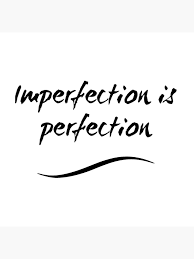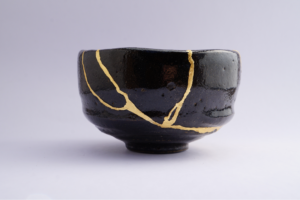“No human face is exactly the same in its lines on each side, no leaf perfect in its lobes, no branch in its symmetry. All admit irregularity as they imply change; and to banish imperfection is to destroy expression, to check exertion, to paralyze vitality. All things are literally better, lovelier, and more beloved for the imperfections which have been divinely appointed, that the law of human life may be Effort, and the law of human judgment, Mercy.” ―
You’d think it would be the most natural thing in the world to be yourself. After all, who else would you be?
Turns out, whoever you might want to pretend to be.
For many, oneself is the last person they want to be. When you grow up feeling like half a loaf, pretending to be a whole loaf makes all the sense in the world.
To compound the problem of being yourself, those raised in religious traditions that taught we’re all broken from birth, scarred by original sin, have all the more reason to be someone else.
“By his sin Adam, as the first man, lost the original holiness he had received from God, not only for himself but for all humans.” ~ From the Catechism of the Catholic Church
So is it really surprising the proposition of being yourself is a non-starter for many?
Who likes looking into a cracked mirror?
So to escape from our broken selves we look to become someone who has —
- more brains,
- more money,
- more friends,
- more opportunities.
Even if it means living in a fantasy world, anything is better than reality. Some of us resorted to drugs and alcohol to create that world.
Trouble is, it’s hard to hide. Our real self keeps pounding at our door demanding to be acknowledged. And when we do a tidal wave of guilt and shame washes over us.
Herein lies the problem: You can’t finally escape yourself.
That can feel very scary.
Here’s my story.
I had been sober less than six months when I visited my aunt, a Catholic nun. I felt like a worthless sinner and wanted to be in the presence of someone I regarded as a saint, hoping some of her goodness would rub off on me.
You get the picture — I was a pretty much down on Pat.
My aunt was of the old school: wore a habit, never missed her daily devotions and lived a communal life until the day she died.
It took her no time to figure out I’d placed her on a pedestal and wanted her words of wisdom spoken from on high.
She was having none of it.
Instead, on a long walk through West Seattle, she proceeded to tell me the story of her life.
- Her broken childhood
- Her dad’s alcoholism
- Her mother deserting the family
- Her early miseries in religious life
- Her loneliness
- Her feelings of ostracism
Her story blew my mind. I had no idea she’d had such a hard journey.
It was a stunning revelation to learn her life had been just as broken as mine. Her sufferings were like my own. She was in need of the same comfort as I was.
How could this be?
My aunt was not a complicated person, not a dogmatic believer, or any kind of religious zealot. She was a simple woman in the sense she didn’t over-think her life.
She told me brokenness was the way of us all.
She had learned this truth years ago during a retreat. It was there, when other sisters shared their broken experiences, that light poured in and she could see her life was not different than any other life, her imperfections no less consuming, her yearning no less ardent.
In fact, being human was to feel exactly as she did. What it meant to have a heart was to feel it break. What it meant to have a soul was to experience wrestling in darkness.
With that revelation she found the peace of mind she so craved and the self-acceptance she so prayed for.
The broken pieces finally came together.
She passed on that truth to me — our perfect imperfection.
Just a thought…
Pat
Copyright © 2023 Patrick J. Moriarty. All Rights Reserved.
Would you like to submit a post to Just A Thought? To learn more, please click here.




